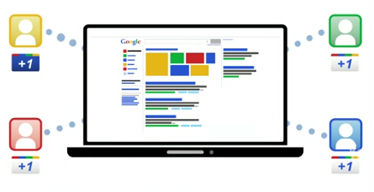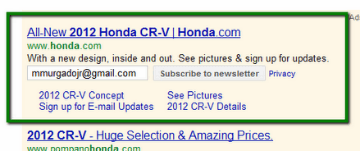The From Line
 Google recently announced a change in their privacy policies. The new format will combine existing privacy policies into one, gathering customer data from all of its services including search, Gmail, YouTube, Google+, and Google Docs. Essentially Google is making a move to be more competitive with the likes of Facebook who has been collecting a wider spectrum of data while providing its customers a more personal experience. Having a unified privacy policy that applies to all products will allow for data integration across multiple mediums and will improve the personalization of a user’s experience. So what does this mean for marketers? Overtime customers will become desensitized to such policies as the all inclusive privacy model becomes the norm. Google is leading the way and opening the flood gates for other marketers to revamp their privacy policies as well.
Google recently announced a change in their privacy policies. The new format will combine existing privacy policies into one, gathering customer data from all of its services including search, Gmail, YouTube, Google+, and Google Docs. Essentially Google is making a move to be more competitive with the likes of Facebook who has been collecting a wider spectrum of data while providing its customers a more personal experience. Having a unified privacy policy that applies to all products will allow for data integration across multiple mediums and will improve the personalization of a user’s experience. So what does this mean for marketers? Overtime customers will become desensitized to such policies as the all inclusive privacy model becomes the norm. Google is leading the way and opening the flood gates for other marketers to revamp their privacy policies as well.
Takeaway: The winners will balance privacy with increased value through personalization.
In order to make this work to your advantage, you will need to reassess your privacy policies and find a balance that customers are comfortable with. Most privacy policies were created between 2001 and 2005 when the public was still sensitive about this subject and therefore are due for a makeover. However, in order for a revamped privacy policy to provide balanced benefits, it must be carefully tailored to fit the behaviors and comfort levels of its customers. You will need to dig into your existing policies and adjust accordingly.
 Back in September, Facebook unveiled their newest update, “Timeline”, poised to eventually replace users “Walls”. At that time, the update was only available to developers; but according to a Facebook spokesperson, the roll out should be completed to all users within the next few weeks. If you have yet to make the switch on your personal profile, it’s about that time. You must be rolling your eyes and sighing at the thought of yet another Facebook update. However, this one’s worth it. It’s going to be a game changer. Marketers need all the time they can get to acclimate themselves with the new interface before Timeline is launched for brand pages.
Back in September, Facebook unveiled their newest update, “Timeline”, poised to eventually replace users “Walls”. At that time, the update was only available to developers; but according to a Facebook spokesperson, the roll out should be completed to all users within the next few weeks. If you have yet to make the switch on your personal profile, it’s about that time. You must be rolling your eyes and sighing at the thought of yet another Facebook update. However, this one’s worth it. It’s going to be a game changer. Marketers need all the time they can get to acclimate themselves with the new interface before Timeline is launched for brand pages.
Takeaway: Tell the story of your business.
Facebook Timeline for businesses is unknown territory, but the question is not IF it will happen, but WHEN. According to a recent Mashable article, it’s a known fact that “consistency in both functionality and appearance is really important to Facebook” but logically, they need to have their base of personal users switched over before delving into business profiles. So for the time being, marketers need to do as much research and planning as possible. I have come up with a few notable predictions for when the Timeline rolls out to brand pages…
The “cover photo” will be the golden egg. It will allow marketers free reign to customize a billboard-like space above their page, essentially affording them prime real estate for free. The possibilities are endless. Additionally, it has been suggested that the new Timeline will create an increased emotional experience between brand and customer. It will no longer be a blasting of “check out this sale!” or “Like our page!” Customers and brands will now interact in a way that is more peer to peer. Sharing “life events” with each other via the Timeline will help solidify this. Finally, the switch from a “wall” view to a Timeline now allows page owners to change dates/times/places of past events, as well as add in new “life events”. I see this leading brands to post such “life events” within their timeline and challenging customers to engage in a scavenger hunt of sorts. A post embedded within the Timeline that includes a deal or special offer will not only drive traffic to the page but will increase engagement beyond the typical news feed skimming. I predict the Timeline change will alter the way customers interact with businesses. According to a Facebook representative, so far “very few people ever return to a Facebook brand’s page after liking it. People are 40-120x more likely to see your posts in their news feed.” The Timeline is like a brand’s own personal news feed. Marketers will need to make the most of this change and reward returning customers.
 Google recently introduced its newest feature upgrade, Google Search Plus Your World, or Search+ for short. Essentially this feature will draw information for search results based on social circles and interaction. (research by Nielsen suggests that 42% of people trust search results, but 90% trust recommendations from friends). So far, Search+ pulls heavily from Google+ users, but not yet from Twitter or Facebook. The feature, which aims to “improve quality of search results through increased trustworthiness and personalization”, appears to be Google’s way of gaining market share in social networking.
Google recently introduced its newest feature upgrade, Google Search Plus Your World, or Search+ for short. Essentially this feature will draw information for search results based on social circles and interaction. (research by Nielsen suggests that 42% of people trust search results, but 90% trust recommendations from friends). So far, Search+ pulls heavily from Google+ users, but not yet from Twitter or Facebook. The feature, which aims to “improve quality of search results through increased trustworthiness and personalization”, appears to be Google’s way of gaining market share in social networking.
Takeaway: +1 will have impact on other channels besides search and social.
Of course this change in search results is only applicable to users with Google accounts and can easily be turned off by clicking an icon on the right side of the screen. So this is not a function that will immediately and permanently affect every Google user. However, it may not be a game changer (just yet) but it certainly has the capability to be one in the future. Because Search+ relies primarily on social data, relevance on social sites and quality content creation will become more and more important for SEO in the future. Marcus Taylor of SEOptimize said “If I’m right, then I can see a shift in prominence in the SERPs to content producers with an active audience, but only in niches where communities exist.”. Essentially, if your industry has a flourishing online community, it will be increasingly important to be active within it.
Yes, this is our second Google-centric post in a row, but we just can’t let this trend go unnoticed. It definitely seems as if Google is rocking the marketing world yet again. Tech authorities are even comparing the magnitude of this new feature to that of Google’s switch to Universal Search in 2007 (for those of you who don’t know, this update marked the official demise of the old 10-listing SERP. Search results were now integrated with news, video, local and other verticals).
Google places optin form directly in search ad, eliminating the need to visit advertisers’ site.  From an email marketing perspective, list growth has and always will be a top goal. We have covered numerous list growth tactics here in Trends and Takeaways, the good and the bad. Even still, it’s always exciting when something cutting edge like this surfaces. Not only is this concept extremely efficient, combining an advertisers preexisting Google ad with an optin form, it also simplifies the process for the subscriber. Users no longer have to worry about leaving their current page and visiting an advertiser’s landing page. As long as they’re logged into Gmail, the form will auto populate their basic information and with just one click, they’re signed up. It looks like quality and efficient list building practices are finally coming into the mainstream and it’s promising to see a big name like Google facilitating it.
From an email marketing perspective, list growth has and always will be a top goal. We have covered numerous list growth tactics here in Trends and Takeaways, the good and the bad. Even still, it’s always exciting when something cutting edge like this surfaces. Not only is this concept extremely efficient, combining an advertisers preexisting Google ad with an optin form, it also simplifies the process for the subscriber. Users no longer have to worry about leaving their current page and visiting an advertiser’s landing page. As long as they’re logged into Gmail, the form will auto populate their basic information and with just one click, they’re signed up. It looks like quality and efficient list building practices are finally coming into the mainstream and it’s promising to see a big name like Google facilitating it.
Takeaway: It’s still early, but keep an eye out for this game changer.
Normally we stick to proven and executable trends here, but we just couldn’t help ourselves with this one. Obviously it is in its testing phases and there is little hard data to analyze, but judging by the big names who have jumped in to test, I think this format is here to stay. This trend, when and if it takes off, will inevitably change the way we look at search marketing. Where cost per click, cost per impression etc left marketers confused when calculating their ROI in the past, cost per acquisition will be the tangible game changer. Marketers will be able to quantify their results and see exactly what it costs to build their lists.
 It has long been understood that pointing all your company’s marketing efforts in one direction will not yield the best possible results. Most recently, multichannel integration has included both online and offline mediums, but not without a significant amount of confusion. A recent STRATA study found that “more than half of US media buyers said less than 25% of their clients are running online and offline integrated campaigns” and even more surprisingly, one in four media buyers didn’t have a single client employing a multichannel strategy. This could be attributed to the fact that it is a considerably more complex process to measure the combined ROI of a multichannel marketing campaign. A Mckinsey Consulting study suggested that “onlines confusing and incompatible set of metrics may be most at fault” for the low percentage of marketers making use of a multichannel campaign as well as the “challenges with measuring overall investment”. Marketers are getting lost and instead of utilizing the tools available to them, they are shying away from integration all together. This doesn’t have to be the case. There is an easier way to integrate online and offline. Email is the one channel that will help immediately while providing rich customer metrics. An effective email marketing campaign can help solve the problem of origination as well as track the results of a particular campaign and compound its positive effects by layering impressions across multiple channels.
It has long been understood that pointing all your company’s marketing efforts in one direction will not yield the best possible results. Most recently, multichannel integration has included both online and offline mediums, but not without a significant amount of confusion. A recent STRATA study found that “more than half of US media buyers said less than 25% of their clients are running online and offline integrated campaigns” and even more surprisingly, one in four media buyers didn’t have a single client employing a multichannel strategy. This could be attributed to the fact that it is a considerably more complex process to measure the combined ROI of a multichannel marketing campaign. A Mckinsey Consulting study suggested that “onlines confusing and incompatible set of metrics may be most at fault” for the low percentage of marketers making use of a multichannel campaign as well as the “challenges with measuring overall investment”. Marketers are getting lost and instead of utilizing the tools available to them, they are shying away from integration all together. This doesn’t have to be the case. There is an easier way to integrate online and offline. Email is the one channel that will help immediately while providing rich customer metrics. An effective email marketing campaign can help solve the problem of origination as well as track the results of a particular campaign and compound its positive effects by layering impressions across multiple channels.
